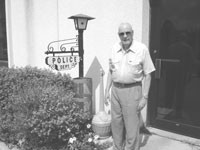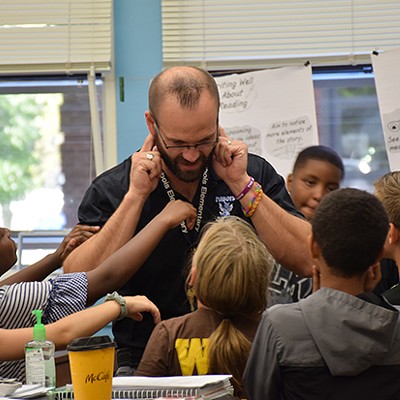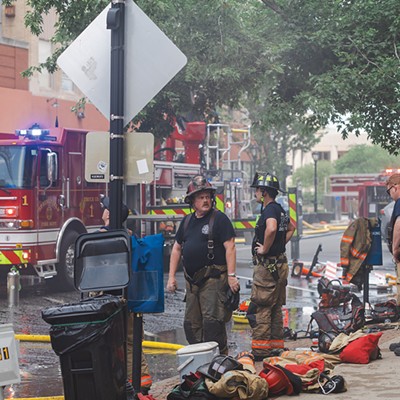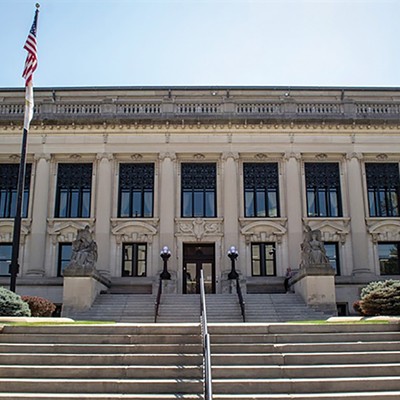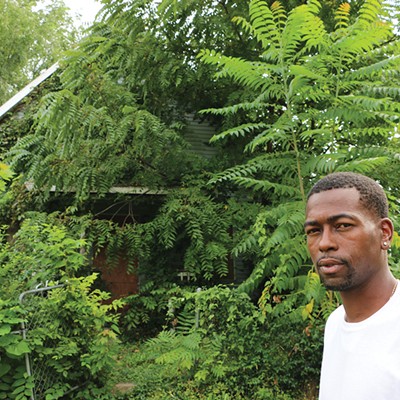Jacksonville is known for its two small private colleges, its state-supported educational institutions, and the oldest of the Illinois Department of Mental Health's developmental centers. But worldwide, many more people have learned of the town by stumbling across mentions of one of the most mysterious cases in downstate-Illinois history.
On April 13, 1959, Bruce Campbell Sr. and his wife, Mabelita, drove to Jacksonville from their home in Northampton, Mass., and took a room at the Sandman Hotel. The couple had come to see their newly born first grandchild. He was the son of their only child, Bruce Campbell Jr., who taught chemistry at Jacksonville's MacMurray College. Two weeks later, Mabelita Campbell returned home alone.
No fight had occurred, no funeral. In truth, to this very day, no one has any idea what became of Campbell Sr., a prominent 57-year-old stock-investment counselor.
When he arrived in Jacksonville, Campbell was so visibly exhausted from his marathon drive -- his son described his father's state of mind as "rational but disoriented" -- that it was arranged for him to be seen by Dr. E.C. Bone, a local physician. Campbell Jr. later told police that his father was given medication to help him sleep. It didn't seem to work.
Campbell was restless and paranoid that night, his wife told police, according to a later account by Charles Runkel, a Jacksonville police captain at the time. Twice before 1 a.m., Campbell uncharacteristically awakened her to ask whether their car was locked, she said. Twice she reassured him and told him to go back to sleep. When she woke again, on her own, at 2:15 a.m., she was alone. A quick search of the hotel room and their car revealed no sign of the elder Campbell's departure but, rather, turned up a disturbing list of left-behind items: Campbell's wallet, all of his money, his shoes, his glasses, his keys, and all of his clothes. The only items missing were the bright-green pajamas he had worn to bed.
The entire day after the disappearance, Runkel and Police Chief Ike Flynn surveyed the area, both in a fixed-wing airplane and, later, in a helicopter. They found nothing. The next day, the search was joined by local firefighters in boats, who dredged the local branch of the Mauvaisterre Creek, and 150 male students from MacMurray. Again, nothing. On the third day, the entire 235-member male population -- students and staff -- of MacMurray College, plus 50 students from Jacksonville High school, joined the search.
Dr. Richard Freiburg -- who, with his wife, Dr. Mary Freiburg, taught biology at MacMurray at the time -- remembers the situation well: "I took part in the search. Keep in mind, this was in a day and age when attendance at classes was not optional. If you didn't show up, it would hurt your grade. I remember the dean dismissing classes that day. That was a rare thing. We searched a large ... well, an absolutely huge area. It was a really long day. We never found anything, though."
The Jacksonville Courier reported that the massive volunteer search crew, broken into small groups, systematically covered a six-mile-radius-area around Jacksonville, including all waterways. It was assumed, because there had been no reports of a barefoot man making his way around the city in pajamas and because the Sandman Hotel was on the northern edge of the city, that Campbell must have traveled north into recently planted fields.
A man of Campbell's stature -- he stood 6-foot-4 and walked with a slight limp -- would have been unmistakable and relatively easy to spot, especially in his pajamas. Unfortunately, this assumption proved overly optimistic. Dozens of reports of tall hitchhikers from a wide area including White Hall, Murrayville, Woodson, New Berlin, and Alexander kept police scrambling for days, but all proved to be simply what they were reported as -- tall hitchhikers, who did manage to get a convenient ride from the police.
"We have looked everyplace that has been suggested and have run out of ideas on what to do next," said Flynn to the Courier. "A fortune-teller told us that Campbell was seven miles from Jacksonville, either northeast or northwest of the city. We have even looked there."
The fortune-teller may have been onto something, though; the Courier reported that the last and practically only solid lead the police received came a week into the search. A farmer who lived several miles northwest of Jacksonville told police he'd been awakened by shouts on or near his property on the night Campbell went missing. The police immediately checked the area but came up empty-handed. Flynn told the press the case was "one of the most baffling mysteries that has occurred here."
After two anxious weeks, Mabelita Campbell reluctantly returned home to Massachusetts. Before her death last month, she never learned what happened to her husband.
After several months of extensive but futile follow-ups on anything even resembling a lead, the Federal Bureau of Investigation launched its own investigation. And on the first anniversary of the disappearance, it was revealed that the distraught Campbell family had spend almost all of their savings on private investigators who distributed Campbell Sr.'s photo and description to police departments across the country and posted a $500 reward for any information as to his whereabouts. Neither the FBI nor the private investigators found anything.
There were rumors, of course. Today, three locals, who wish to remain anonymous, recall whispered stories describing how a girlfriend had picked Campbell up at the hotel and whisked him off to a new life. But there's no proof. Another longtime resident is convinced that foul play was involved.
Dr. Edwin Ecker, retired math professor at MacMurray College, says his colleague Campbell Jr. "was certain that there was no fight, no history of depression, or anything of the sort between his parents."
Freiburg recalls that the younger Campbell later spoke of his father in terms of being deceased, though Freiburg never pried into the son's reasoning for this belief.
Runkel, the police captain, even remembers a report of a disturbance at Jacksonville's First Presbyterian Church -- Bruce Campbell Jr.'s church -- not long after the disappearance. It seems one woman began accusing another of being responsible for the disappearance. Runkel notes, though, that this woman was also well known for mental instability.
Ironically, the inscrutable case would be the last significant one of Flynn's career. Just weeks after the hoopla had calmed, Flynn retired, and Runkel was promoted to succeed him. Runkel recounts how Flynn, even though he was off duty, never let the case go. He died of cancer several months after retiring, but until the end, he never ceased checking in at the department to learn whether any new clues had surfaced. To this day, none has.
"As far as mysteries go, Jacksonville has never seen anything like that doggone thing," Runkel says.
"As far as a case where absolutely nothing, no clues, nothing was ever found ... it probably never will see anything like it again, either."
Eight years after Campbell's disappearance, the Courier ran a brief article reporting that Mabelita Campbell had finally received benefits from her husband's life-insurance policy. Campbell Sr. was, as far as the insurance company was concerned, finally dead. But was he?
Today, for residents of Jacksonville, Bruce Campbell's disappearance ranks right up there with Amelia Earhart's and Jimmy Hoffa's.
"In that we never found anything one way or the other, I suppose you might say the case is still open, but I don't think we are going to learn anything now," Runkel says.
"It was just the darnedest thing."

